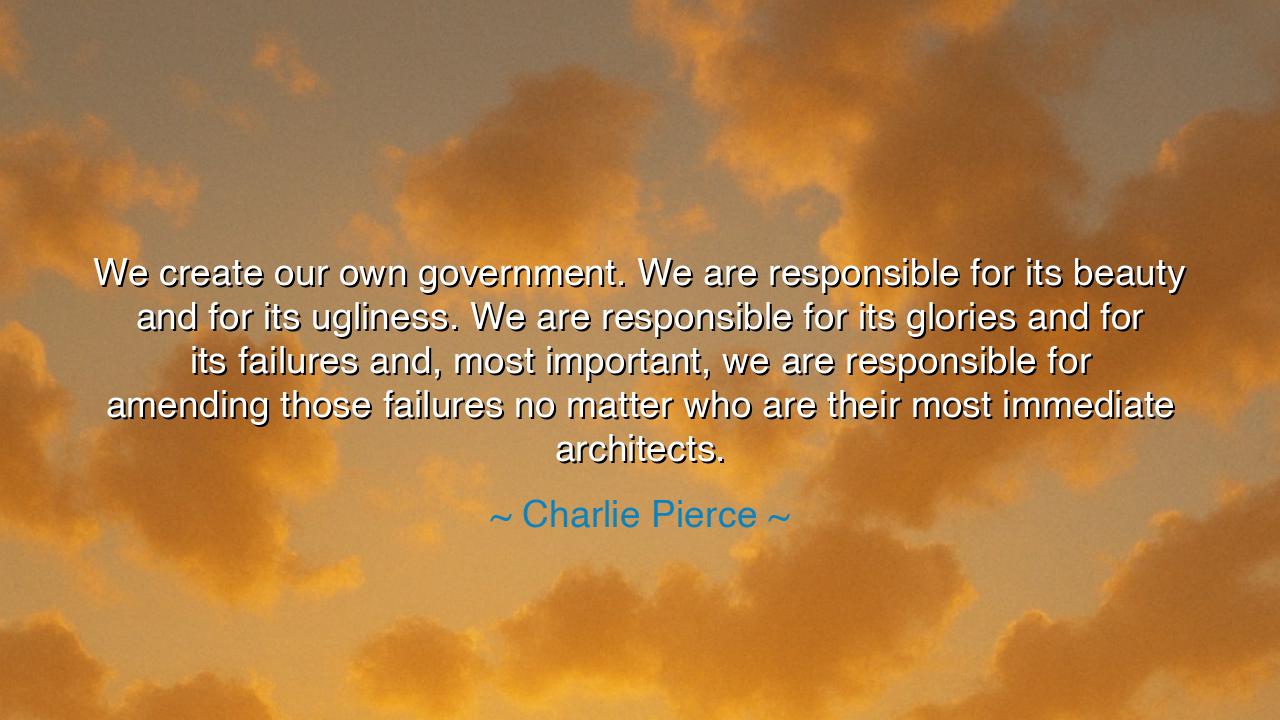
We create our own government. We are responsible for its beauty
We create our own government. We are responsible for its beauty and for its ugliness. We are responsible for its glories and for its failures and, most important, we are responsible for amending those failures no matter who are their most immediate architects.






Hear, O inheritors of liberty and stewards of the common good, the words of Charlie Pierce, who declared: “We create our own government. We are responsible for its beauty and for its ugliness. We are responsible for its glories and for its failures and, most important, we are responsible for amending those failures no matter who are their most immediate architects.” In these words lies not the cynicism of complaint, but the fierce and ancient truth of citizenship—that government is no distant entity ruling over us, but the mirror of our collective will, the living reflection of our virtues and our vices alike. Pierce calls upon the conscience of every generation to remember that the state is not a creation of kings or elites, but of the people themselves—and that the duty of its care rests upon the shoulders of all who live beneath its laws.
Charlie Pierce, a journalist and commentator, wrote these words in the context of American democracy, yet their meaning transcends all borders and ages. His voice joins the timeless chorus of those who understood that freedom and responsibility are twin flames—one cannot burn without the other. He reminds us that the failures of government are not the failures of “them,” but of “us.” When corruption festers, when injustice spreads, when apathy silences conscience, the roots of those ills lie in the soil of public neglect. For a government’s corruption grows where citizens cease to care, and its excellence flourishes where citizens remain vigilant, involved, and courageous.
This truth is as old as the republics of antiquity. In the days of Athens, when the people grew complacent and ceased to attend the assemblies, demagogues rose to power and led the city into ruinous wars. The philosopher Pericles once warned that the price of liberty is participation—that democracy dies not in sudden collapse, but in quiet indifference. Pierce’s quote echoes this same lesson: that the moral character of a government is the sum of the moral choices of its people. To lament a corrupt system while doing nothing to reform it is to share in its guilt; to turn away from politics in disgust is to surrender the future to those without scruple.
He speaks too of the balance between pride and humility. “We are responsible for its beauty and for its ugliness.” In this, he teaches that patriotism is not blind worship, but honest stewardship. To love one’s country is not to deny its faults, but to strive to make it better. The truest citizens are not those who praise unthinkingly, but those who labor tirelessly to heal what is broken. As the prophet once said, “The builder does not curse the cracks in the wall—he repairs them.” So must we see our nations as living works of our own hands, never perfect, but always capable of renewal through courage and compassion.
History gives us the luminous example of Nelson Mandela, who, after the fall of apartheid in South Africa, did not rise in vengeance, but in reconciliation. He knew that the government that would replace oppression could not be built from hatred, but from shared accountability. “We are responsible,” he might have said, echoing Pierce, “not only for what we endured, but for what we will build.” Through his leadership, Mandela transformed the pain of a nation into purpose, proving that to amend a nation’s failures is the highest act of citizenship.
Yet Pierce’s words also warn against the temptation to lay blame solely upon leaders. “No matter who are their most immediate architects,” he writes, reminding us that every government—good or evil—is born from the culture that sustains it. Tyranny rises when fear triumphs over courage; corruption thrives when silence greets deceit; reform blossoms only when the people reclaim their role as guardians of justice. Thus, every generation must choose: to complain as spectators or to act as participants in the shaping of their destiny.
The lesson, then, is both solemn and empowering. You are not subjects of government—you are its makers. Its failures are not final, for reform is forever within reach. If you would see justice done, you must do it. If you would see truth prevail, you must speak it. If you would see virtue restored, you must live it. This is the sacred contract of democracy: that freedom is sustained not by rulers, but by the hearts of the ruled.
So let Charlie Pierce’s words be passed down like a torch through the generations: that government is not a thing apart from us, but a reflection of us. When it is just, we are just; when it falters, we must repair it. The glory of a nation lies not in its monuments, but in the hands that dare to mend its cracks. For the health of any republic depends not on the wisdom of the few, but on the courage of the many—those who remember that self-government is not a gift, but a daily act of devotion.






AAdministratorAdministrator
Welcome, honored guests. Please leave a comment, we will respond soon